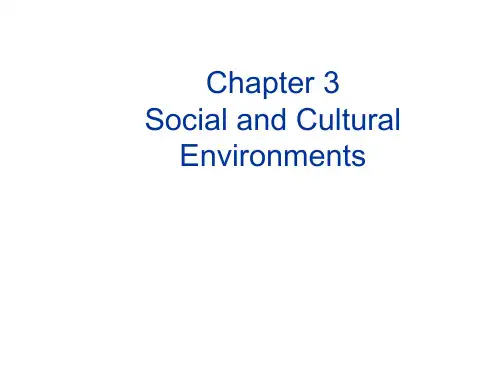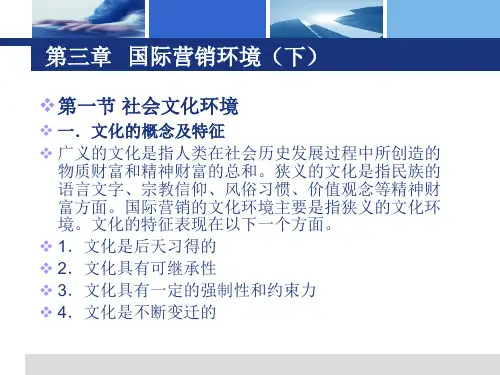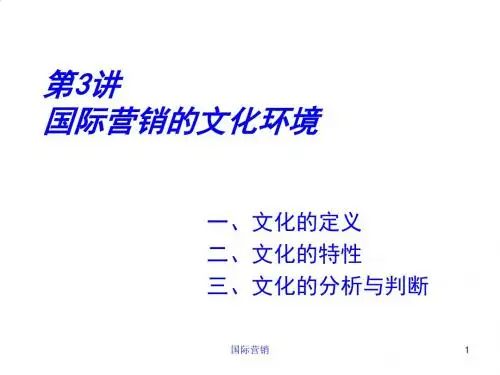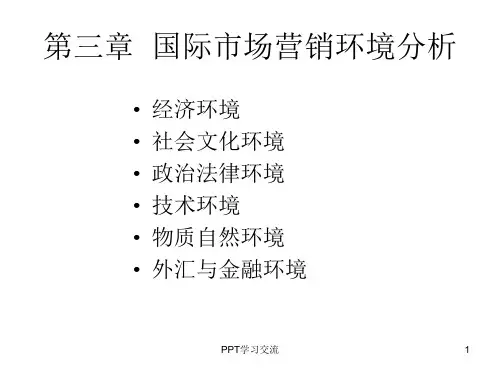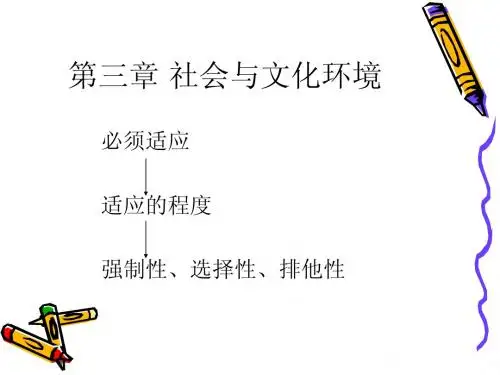- 1、下载文档前请自行甄别文档内容的完整性,平台不提供额外的编辑、内容补充、找答案等附加服务。
- 2、"仅部分预览"的文档,不可在线预览部分如存在完整性等问题,可反馈申请退款(可完整预览的文档不适用该条件!)。
- 3、如文档侵犯您的权益,请联系客服反馈,我们会尽快为您处理(人工客服工作时间:9:00-18:30)。
Culture has been conceptualized as:
1. “Software of the mind” culture is a guide for humans on how to think and behave; it is a problem-solving tool (Hofstede)
(5) Government policies influence the thinking and behaviors citizens of adult citizens, e.g., the French government offers new “birth bonuses” of $800 given to women as an incentive to increase family size
(1) Family behavi源自r varies across the world, e.g., extended families living together to Dad washing dishes
(2) Religious value systems differ across the world, e.g., Muslims not allowed to eat pork to Hindus not allowed to consume beef
Importance of culture in international marketing
A successful marketer must be a student of culture
Culture is pervasive in all marketing activities— in pricing, promotion, channels of distribution, product, packaging, and styling
2. Two researchers suggest that geography influences everything from history to presentday cultural values
3. First, Jared Diamond states that historically innovations spread faster east-to-west than north-to-south
(6) Corporations influence culture via the products they market, e.g., MTV
Cultural Dynamics in Assessing Global markets
Theory– Culture is like an iceberg
Elements of Culture
International marketers must design products, distribution systems, and promotional programs with due consideration to culture, which was defined as including five elements:
4. Second, Philip Parker reports strong correlations between the latitude (climate) and the per capita GDP of countries
Origins of Culture: History
1. The impact of specific events in history can be seen reflected in technology, social institutions, cultural values, and even consumer behavior
Origins of Culture: The Political Economy 1. For most of the 20th Century three approaches to governance
competed for world dominance: fascism, communism, and democracy/free enterprise
Understanding culture can determine success or failure in international marketing
Culture’s Pervasive Impact
• Culture influences every part of our lives
3. A “thicket” (U.S. Ambassador Hodgson)
Origins of Culture: Geography
1. Geography, which includes climate, topography, flora, fauna, and microbiology, influences our social institutions
• Cultures impact on birth rates in Taiwan, Japan, and Singapore
• Birthrates have implications for sellers of diapers, toys, schools, and colleges
• Consumption of different types of food influence is culture: Chocolate by Swiss, seafood by Japanese preference, beef by British, wines by France and Italy
• For e.g., American trade policy depended on tobacco being the original source of the Virginia colony’s economic survival in the 1600s
2. The military conflicts in the Middle East in 2003 bred new cola brands, Mecca Cola, Muslim Up, and Arab Cola
Origins of Culture: Technology
1. Technological innovations also impact institutions and cultural
2. Jet aircraft, air conditioning, televisions, computers, and the internet have all influenced culture
Introduction
Culture refers to “the human-made part of human environment— the sum total of knowledge, beliefs, art, morals, laws, customs, and any other capabilities and habits acquired by humans as members of society”
2. An invisible barrier… a completely different way of organizing life, of thinking, and of conceiving the underlying assumptions about the family and the state, the economic system, and even Man himself” (Hall)
• Even diseases are influenced by culture: stomach cancer in Japan, and lung cancer in Spain
Definitions and Origins of Culture
Culture is the sum of the “values, rituals, symbols, beliefs, and thought processes that are learned, shared by a group of people, and transmitted from generation to generation”
2. Fascism fell in 1945; Communism crumbled in the 1990s
3. Necessary to appreciate the influence of the political economy on social institutions and cultural values and ways of thinking
• Social institutions including family, religion, school, the media, government, and corporations all affect culture
The family, social classes, group behavior, age groups, and how societies define decency and civility are interpreted differently within every culture
Cultural Dynamics in Assessing
Global markets
Venturing into difference cultures without adequate preparation can be just as dangerous as a ship maneuvering ice waters without charts, hoping to be lucky enough to avoid hitting an iceberg. The difference is that the ship will know immediately when it hits an iceberg. Unsuspecting companies may never realize they hit an iceberg but they will , nevertheless, feel the impact. It appears in the form of delayed and abandoned projects, misunderstanding communications, frustrated employees and a loss of business and
